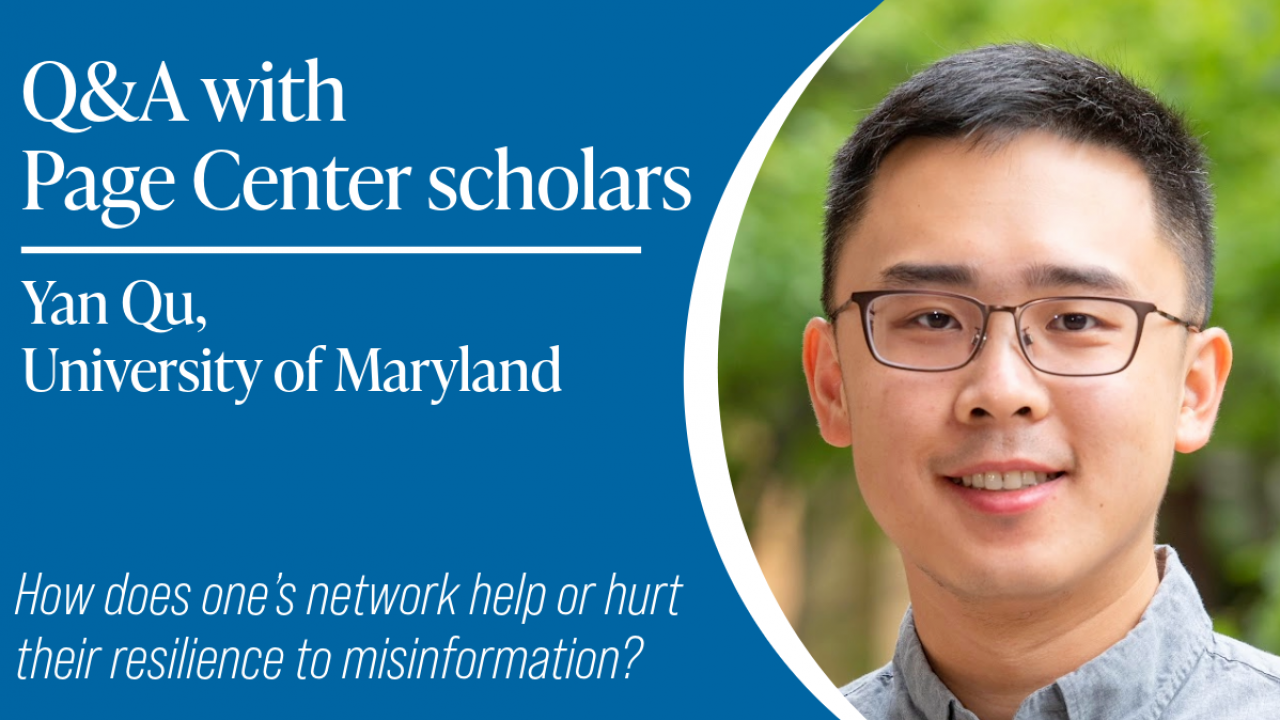September 23, 2024
A network view on resilience to misinformation – Scholar Q&A with Yan Qu

When combining research interests, Page Center scholars Shuning Lu, North Dakota State University, and Yan Qu, University of Maryland, address many timely issues facing today’s media consumers. Lu’s research focuses on news consumption and engagement with digital media, while Qu studies social networks and how they influence engagement. During conversations, the idea of networked resilience to misinformation emerged, which led the first-time Page Center scholars to submit a research proposal for a study that will examine how one’s network might help or hurt their resilience to misinformation. Their project is part of the Page Center’s 2024 research call on expanding theory for integrity in public communication. In this Q&A, Qu explains the definition of resilience, what a framework might look like and how the project based in theory also has real-world, practical implications.
For this study, what do you mean when you say “network”? How does resilience fit into what you’re studying?
A network is a social structure. It’s a set of interconnected social relationships we have that is generated from our daily life interactions. We can think of networks both at the level of personal or whole network structure, and they can shape resilience in positive or negative ways. We want to explain what the mechanisms are that explain the power of a network in shaping people’s misinformation resilience. We will focus on two mechanisms, including both social capital, which can be generated out of interactions or discussions with others about the news or social issues, and social influence, which means your opinions or behavior tend to become similar to those you interact with.
Can you give an example?
Yes, taking political discussion as an example, if you only talk with people who share similar political ideology as you, you may just naturally accept any facts and viewpoints that flow in your network without engaging in critical thinking. You may have no doubts about the information. But whenever you have people in your network that hold different kinds of political opinions, or they share different kinds of information, that will really motivate your critical thinking and engagement on the topic, and you’ll get certain kinds of skepticism toward the information. This can determine how you think about and how you cope with political misinformation. We tend to think about different dimensions of people’s misinformation resilience, which may not only involve an individual’s awareness or their abilities to verify, but also their ability to correct misinformation in their social environment.
Can you share your plan to build an understanding of networked resilience to misinformation?
We are approaching our research in two phases. In the first phase, we're going to conduct a survey with a national representative sample. We're trying to dive into people's personal discussion networks, essentially a group of people with whom they talk to about news issues or events daily. So basically, we want to ask questions such as: Who are the people in your news discussion network? What are their social demographic traits? How do they deal with misinformation? We will also ask about participants’ own beliefs, attitudes and behaviors. Through the survey, we are trying to see how personal network attributes could be linked into their awareness of misinformation risks, attitudes toward fact-checking, and information verification strategies,.
For the second phase, we're going to take a step further and do experimental studies that will further establish the causal relationship between people’s network and their resilience to misinformation. For example, we are thinking about designing an experiment that will explore different types of misinformation, or different attributes of misinformation, such as the sources, the personal relevance or the topics of misinformation, and how those attributes determine the way you use your personal network to verify or correct a piece of misinformation.
Can you talk about what a potential framework would look like or what you expect to see in terms of results?
This research project carries both conceptual and practical values. Resilience to misinformation is actually not a new construct, because it has been studied by a lot of scholars. But we couldn’t find previous studies trying to conceptualize this concept at the network level. That is something that we see as a gap to be filled. Some existing studies see resilience to misinformation as being an individual quality and they design individual-level intervention to combat misinformation. We also see misinformation resilience at the country level in other studies, which examine how political or social factors influence people's susceptibility to misinformation. But, we really think that social network is an essential context, because a lot of times we hear about misinformation or false beliefs from talking to others rather than consuming it directly from online media. That is why we think it’s important to conceptualize it at the network level.
How does the Page Center’s support help you with this project and help you and Shuning achieve your research goals?
The Page Center plays a crucial role in fulfilling our research goals. We are very grateful for this financial support that helps us advance public communication integrity. With this kind of grant, we can collect data from a representative sample nationwide. We can engage in research with enough rigor to find results that are valid and of high quality to be published in academic, peer-reviewed journals. We also really appreciate that the Page Center offers us venues to publicize our research findings in both scholarly and academic communities, and at our upcoming Research Roundtable presentations next summer in San Francisco. We will get to hear a lot of feedback and comments on how our findings are useful and relevant in today’s public communications context.
